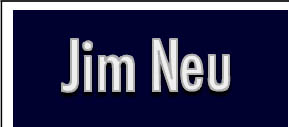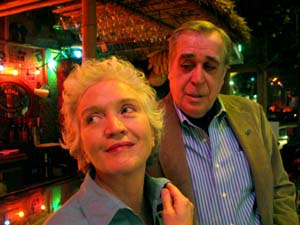
"La Vie Noir" by Jim Neu, directed by
Keith McDermott
A group of star-crossed strangers become trapped in a Noir world of lonely
streetlights,
smart talk, killer shadows and wet footsteps.
 |
| Mary Shultz and Jim Neu in Tiki Bar, NYC. Photo by Jonathan Slaff. |
February 15 - March
4, 2007
La MaMa E.T.C. (First Floor Theater), 74A East Fourth Street
(presented by La MaMa E.T.C.)
Thursdays - Saturdays at 8:00 pm; Sundays at 2:30 pm
$15; box office (212) 475-7710; online ticketing available at www.lamama.org.
Running time: 75 minutes
CRITICS ARE INVITED on or after February 16.
NEW YORK January 14 -- There are places that really bring out the movie in you, and one is the Blue Heron, a tropical-style lounge on the top floor of the tallest building in a small mid-American city. It's the setting for "La Vie Noir," the latest comedy by Jim Neu (www.JimNeu.com), in which a group of star-crossed strangers become trapped in a Noir world of lonely streetlights, smart talk, killer shadows and wet footsteps. La MaMa E.T.C. presents the work February 15 to March 4 in its First Floor Theater, directed by Keith McDermott and featuring Mary Shultz, Black-Eyed Susan, Jim Neu and a supporting cast of five.
The comedy is rich in the irony, deadpan humor and the elliptical, punchy dialogue that fans of Jim Neu have come to love. It also serves up another delightful gaggle of eccentric characters who, according to director Keith McDermott, "are all struggling in creative ways to cope with a dehumanizing, media-inspired culture – and nearly always succeed."
In "La Vie Noir," our fantasy-friendly culture confronts reality. The question is, which is which? With a storm building outside, an unusual group of customers gathers at the Blue Heron Lounge. They include two people in witness protection, a woman recently found not guilty of shooting her husband on purpose, a budding self-help guru, a burnt-out movie history teacher, and a mysterious figure claiming to be an agent of the Department of the Interior. As the customers share glimpses of their inner lives with each other, some sense that the evening is evolving more like a movie. When the singer performs a song about one of the customers, their suspicions grow. The plot becomes life-threatening when a lightning strike traps them 40 floors up and a tornado is heading their way. The characters’ survival may depend on the answer to the question, “Are we in it or at it?“
Jim Neu's writing has mined the rich vein of irony, contradiction, and absurdity in American popular culture since the late '70s. His gift is to make us laugh at what it's like to have your mind run by those who explain life second-hand. He wrote a whole play, "Situation Room," on how market researchers might target a group of actors to investigate leisure behavior. He has found Hollywood's hard-sold fantasies to be even more provocative, so whether it’s spy films ("Undercurrent Incorporated"), westerns ("Target Audience: The Code of the Western"), detective movies ("Mondo Beyondo"), or Hollywood history ("Kiss Shot"), his comedies have shown how generations of monetized entertainment have altered our attitudes, behavior and reality.
He does it with a complex and distinctive style of language. Neu has been called "the Oscar Wilde of the Postverbal Generation." He is a master of deadpan circumlocution and the elliptical take on language. "La Vie Noir," like all of his plays, is peppered with jokes about detachment ("is it just me or does the music seem to be listening to us?"), reality (Cody: "I don’t think about the past." Cora: "You thought about the past when you thought you knew me.") and the stiff upper lip ("Indifference is a hard emotion to project."). It makes for brilliant dialogue and a minimalist comedy style that is all Neu's own.
The actors include long-time Neu regulars as well as a few new faces. This will be the eighth Jim Neu play Keith McDermott has directed (while also finding the time to write his novel, "Acqua Calda," published by Carroll & Graff in 2004). The cast is headed by Downtown legends Mary Shultz and Black-Eyed Susan as the femmes fatales. (Obie-winner Shultz most recently appeared Adam Bock’s "The Thugs." Black-Eyed Susan, long a denizen of the cutting edge, has recently been working with John Jesurun and the Foundry Theater.) They are joined by performer/artist Agosto Machado, singer/actress Deborah Auer, Hot Peaches/jazz singer Tony Nunziata, puppeteer Chris Maresca and veteran actor John Costelloe.
Music is by Harry Mann and Neal Kirkwood, who have composed music for Neu's plays since the late '80s. Lighting is by Carol Mullins; sets and costumes are by Meg Zeder; sound is by Jacob Burckhardt.
Reviewing Neu's last La MaMa show, "Target Audience: The Code of the Western" (2003-4), Time Out (Robert Simonson) wrote, "Playwright-actor Jim Neu, whose latest opus of whimsy and babble, 'Target Audience: The Code of the Western' recently opened, may be the most unfairly uncelebrated of downtown auteurs. Neu is as adept at twisting language and meaning as Mac Wellman, has been as artistically consistent as Richard Foreman and was cleaving his texts to disorienting songs long before Richard Maxwell was old enough to drink."
Jim Neu began working in theater as an actor in Robert Wilson's company in the early 1970's, performing in New York, Europe, Brazil and Iran. When Wilson began employing text in his work, Neu began writing for him. He contributed to the scripts of Wilson's "Ka Mountain," The Life and Times of Joseph Stalin" and "A Letter for Queen Victoria." Neu began writing his own plays with the Napa Valley Theater Company in California in the late '70s. Since 1992, all his new works have been presented by La MaMa, with the exception of "Aerobia," a collaboration with Douglas Dunn at PS122. In all, Neu has written 27 plays, which have been presented by leading experimental theaters in New York, Chicago, Dallas, San Francisco, Philadelphia and London. They include "Him or Me" (1979), "Basic Behavior" (1982), "Mutual Narcissism" (1984), "Duet for Spies" (1987), "An Evening with Jesse James" (1988), "Live Witness" (1992), "Dark Pocket" (1994), "The Floatones" (1995), "Mondo Beyondo" (1997), Undercurrent Incorporated" (1999) and "Target Audience: The Code of the Western" (2003). In 1993, "Live Witness" was published by Theater Communications Group in their "Plays in Process" series. In recent years some of his earlier work has been revived by the Chain Lightning and Miranda theater companies in New York.
In addition to his own work, Neu has collaborated with theater companies Otrabanda and the Talking Band, and written text for dance works by David Woodberry, Yoshiko Chuma, Charles Moulton and Cathy Weis. He also wrote the screenplays for Andrew Horn's films "Doomed Love" and "The Big Blue," which both premiered at the Berlin Film Festival. Neu is recipient of a 1985-86 National Endowment for the Arts. Fellowship for New Genres, 1987 New York Foundation for the Arts Playwriting Fellowship, and a 1994 New Works grant by the New York State Council on the Arts.
Jim Neu's creative history is being documented on www.JimNeu.com. The site contains insightful introductions by Ulla Dydo and Keith McDermott, overviews (with photos) of all his plays, from 1985 to the present, as well as a chronology of his artistic career beginning with his early days in Robert Wilson's company (1970-75).
# # #
CRITICS ARE INVITED on or after February 16.



